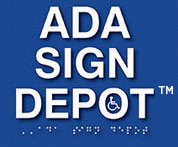The Business Backlash to North Carolina’s LGBT Law
ADA Sign Depot
March 28, 2016

The Business Backlash to North Carolina’s LGBT Law
Source: The Atlantic
by David A. Graham
A bill passed this week pits the state Republican Party’s desire to be friendly to business friendliness against its social conservatism.
When Republicans in North Carolina’s General Assembly decided to pass a law preventing cities from barring LGBT discrimination, creating transgender bathroom accommodation, or enacting minimum wages, they moved quickly. On Monday, they announced a special session. They convened two days later, releasing the legislative language just minutes beforehand. By Wednesday evening, Governor Pat McCrory had signed the bill into law.
The fast pace prevented opponents from rallying against the bill, but it didn’t quell their concerns. The last two days have seen a growing chorus of disapprobation within and outside the state.
The noisier protests come from activists. Hundreds of people rallied outside the legislature on Thursday, and at least five were arrested. Activists planned another demonstration on Friday, using a naughty play on “sit-ins.” “Seeing as our Governor seems so concerned with our bathroom habits we’ve decided to bring him a little gift,” the organizer wrote. “I’ve secured a Port O John to be delivered tomorrow to Raleigh and would love have as many people join us as possible as we attempt to give Governor Pat McCrory this important symbol of the work he’s done for NC.”
“It’s now the law for me to share a restroom with your wife.”
A man named J.P. Sheffield, who lives in Georgia, mocked McCrory in a tweet:
“It’s now the law for me to share a restroom with your wife.”
Less noisy but perhaps more consequential in political terms are the objections being raised by businesses. Liberal protests against Republican initiatives in Raleigh have been par for the course for four years, with little effect. But the business backlash could sting.
The philosophical problem for McCrory is that it’s hard to paint the state as business-friendly when it’s taking steps that major businesses criticize. But it’s hard to win elections with only the support of pro-business conservatives. This isn’t just a theoretical challenge: McCrory is up for reelection in November, running against Democratic Attorney General Roy Cooper, who opposed the law. In Georgia, business backlash against a religious-freedom bill has threatened to derail it. In North Carolina, the type and scale of backlash could determine whether the law remains or whether legislators revisit it—and it could also determine the future course of the state’s conservative movement.
- Tags: Restroom Bathroom ADA Signs Subscribe to this blog's RSS feed.


